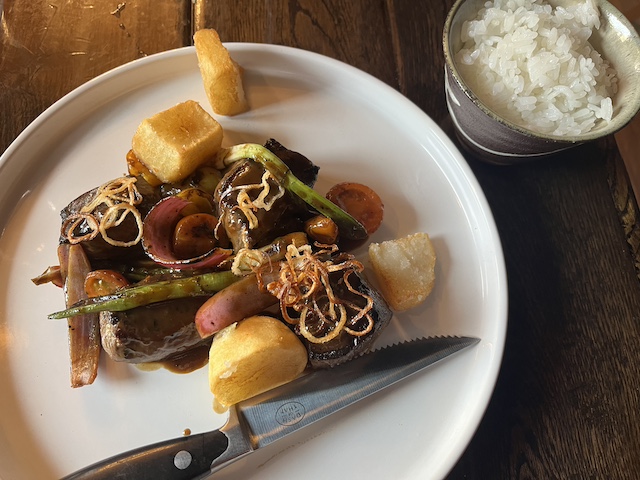Rising Appalachia brings folk mix to Bend
Published 12:00 am Friday, November 6, 2015

- Submitted photoNew Orleans-based world and folk band Rising Appalachia will play Volcanic Theatre Pub on Saturday.
Attention Bend: Rising Appalachia is looking for a few good artists.
Nonprofits, too. Education organizations, water conservation groups, cultural ambassadors, fellow activists — the band wants them all involved for its first show at the Volcanic Theatre Pub in Bend on Saturday.
“We really try and keep an open palate for creative collaborations, I would say, so that we can always be learning about what’s going on locally,” said Leah Song, the band’s co-founder (along with younger sister Chloe Smith), while heading to Nevada for the first show on the band’s West Coast tour. “That’s a really important part of it for us, too, is finding out what local gems there are, either in the nonprofit and education world, or in the cultural and performance world, and trying to feature them when we can.
“So if this interview goes out,” Song continued, “Bend, we would love to know what’s going on in your community, and hope to feature some of the work that’s local to there as well.”
For Rising Appalachia — featuring Song and Smith on vocals and various instruments, guitarist/bassist David Brown and percussionist Biko Casini — this sort of community building and cultural exchange is just as important as the shows the band plays. The Smith sisters’ strong activist streak can be seen in their work with their Rise Collective, which offers youth education programs, art and music workshops across the globe.
There’s the songs, too — including the title track to the band’s 2012 album “Filthy Dirty South,” which addresses concerns about hydraulic fracturing in their native Appalachian Region. Song said the band is trying to hook up with local water organizations at each of its West Coast stops.
The band will also team with the Prison Yoga Project on its current tour, dubbed the Groundswell Tour. The organization, founded at San Quentin State Prison in California, works to bring yoga and mindfulness programs to U.S. prisons. The initiative is one close to Song’s heart.
“I linked up with the Prison Yoga Project this last year and did a workshop with them, and got really, really excited about what they’re doing. And (I wanted) to expose their work to a larger audience and let people know just ways that they can be involved in direct action and support for creating a stronger and more vibrant society,” Song said. “I think that the United States has more people behind bars … than any other country in the world, and I’m not a believer that that’s because there’s that (disproportionate) amount of crime.”
Even before they had a band, Song and Smith were avid travelers — Song first visited Mexico at age 19, and then spent five years living in Cuba, Korea and India. Their parents helped open their horizons at an early age.
“My mother and father met in Nepal, and my father hitchhiked across Latin America and spent time in Asia, so he raised us with all these stories of travel,” Song said.
Music was another big part of that upbringing. The sisters grew up in Atlanta, immersed in the traditional Appalachian folk music of the region. Their mother played jazz piano, fiddle, banjo, mandolin and hammered dulcimer.
“There (were) old-time Appalachian fiddle and banjo jam sessions every week; there were gospel sings within our living room,” Song said.
However, neither sister took to the classical piano lessons they were enrolled in as kids.
“And then like every story of all teenagers, we rebelled hard and didn’t care about any of those (musical) traditions at all, and avoided them completely,” Song said. “And then once we left the house and became adults, we decided that we wanted to know more of those traditions that we were raised in.”
Song was the first to pick up an instrument — banjo — as an adult. She moved to fiddle, giving the banjo to Smith. “We both were doing a lot of fiddle and banjo duets, each of us playing a little bit of both instruments, modestly,” Song said.
The sisters never intended to start a band. In 2006, they recorded and released the first Rising Appalachia album “Leah and Chloe” as “an art project for our folks.” The record combined all their disparate influences — from hip-hop and jazz to world music and, naturally, Appalachian folk — into a mix that remains the band’s calling card to this day.
“We were both out of the house and doing our own things, and we wanted to pay some tribute to their upbringing and say thank you, really, to the whole musical community,” Song said. “… We recorded it in a day and had a great time doing it, and thought, oh, that would be — we’ll have that for the next 50 years. We’ll give it to our grandkids and maybe play at farmers markets every now and then for our groceries.”
Song recalls an early performance at a folk concert in Atlanta as a turning point.
“We were kind of asked to represent this urban and Appalachian sound, and we were terrified,” she said. “We’d never been on the mic, there was a 700-person audience, we were onstage with Grammy Award-winning players. And we did it, and we sold every album that we made in that weekend. We were offered a record contract in that weekend, and kind of got rattled really well.”
The band declined that contract, and most other music industry advances, remaining staunchly D.I.Y. over the years. It has now been touring for close to 11 years, and has released six albums, most recently “Wider Circles,” which dropped in April.
“I feel like it’s the most nuanced and the most subtle album that we’ve created,” Song said. “It just feels like a really strong maturation of our styles, both in the Appalachian traditions and in the world music traditions, and in our own sort of anthem writing and folk styles.”
When not on the road, the band’s members divide their time among their adopted hometowns of New Orleans and the southern Appalachian Mountains and their original hometown, Atlanta. For a band defined by its ties with community, the touring life can be tough.
“I’d say that that’s a sensitive subject for all of us, each one of the band members, because I think that it is — home becomes a much harder thing to really tend to, I’d say,” Song said. “… There’s a place that really is lonely in that part of this job. But I also think we really do our best to try and keep home close to us.”
— Reporter: 541-617-7814, bmcelhiney@bendbulletin.com






